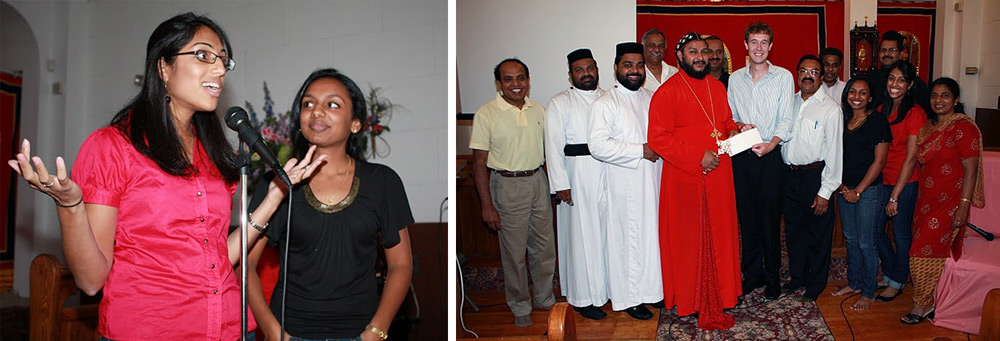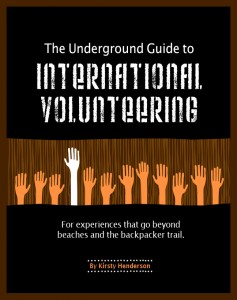
Shooby Leroy Jean-Pierre is a HODR local volunteer. As a translator, educator, and general go-to guy, Shooby serves as a crucial liaison between the international volunteer team and the local community. He also represents another bridge between cultures: he lived in Miami for most of his life, returning to Haiti to a few years ago to take care of his family in Leogane. Here, he reflects on his experience with HODR and his life before and after the January 12 earthquake.
HODR: It’s pretty rare to see Haitians like you getting involved in volunteer organizations like this one. What attracted you to HODR?
Shooby: One of the things that I always kept in mind when I was growing up was not to have a closed perception or impression about life, or the way that you’re leading your own life. So I always try to keep an open mind about everything, just for me to be able to interact in different positions and with different people. So it’s another experience my life is going through, basically.

HODR Local Volunteer Shooby
Tell us how you came back to Haiti.
When I was one I left Haiti. My auntie, she got me out of Haiti, and I grew up in the United States in Miami. I graduated high school in 2002 and my mom died in 2005, so I had to come back because I wanted to participate in her funeral, so I came back…. By me coming back, I eventually stayed, that’s about it…. My mother was taking care of my brother and one of my cousins, so when she died, I basically replaced her in some ways.
Do you feel like you’re more American or more Haitian?
Because of my personal background, I feel that I’m just me, going through life. Because this is not the first incident [of] someone to leave their home country and growing up somewhere else and coming back to their home country but with a different mind-state and a different mentality and a different view on life, so I’m still the same person if I grew up anywhere in the world. My view on life and the way that I try to make certain decisions, that comes from the way that I grew up, and the way that I just have my own personal view on life.
What have you found most rewarding about your work with HODR?
The most rewarding thing is that HODR is here. And that’s something that a lot of people are grateful for, because of so many different reasons. One of those reasons are: until HODR came to Haiti, where we were at in Leogane, we were just struggling. I was trying to find a job. A lot of my friends were trying to find a job, and we were basically unsuccessful in doing that because of the different criteria, different positions and just being able to get a job was kinda rough. So we was going through that for a while until we just touched down with HODR, just seeing how it is. Realizing that it’s a nonprofit organization, and just understanding why HODR is the way that it is, what benefits that it has, how can it help us in the future, how can it help us in the present time, how can they help us sort out any short-term or even long-term goals that we may have. HODR is basically what you’re hearing. It’s hands on. They’re giving us a hand, in any way that they can, to create possibilities for us in the future to have a better life.
What’s next for you?
Personally, I want to get into the fire academy in Canada, or I want to get a student grant anywhere so I could go back to school, and just see what’s out there. I want to keep my options open, to see what would be the best thing for me right now. And just to work on that to see if I’ll be able to achieve some of those goals that I have.
Do you think HODR has helped you find some of those opportunities to do things that are more international?
Yeah, I have a very good friend, TC, he always backs me up… He always try to give me a lot of confidence, try to give me a lot of push, try to sort things out between my situation and the way that that can work out so I can do better further down the line. So HODR actually creates a lot of advantages and gives you a lot of options, and you just have to be willing to go for it and try to make everything work out so you can be successful.
What do you hope to bring back to your community in Haiti? Do you see yourself coming back to Haiti someday?
It’s been an open option for a long time. I never thought about it. I see that Haiti is a lot of people enjoy, a lot of people would like to see it. Even though it may not come to something that they thought about in the past or even in the present time but for me personally, I would like to come back. And just be able to see what’s new, what’s changed, if there’s a particular position or something that needs an extra hand… I’m always willing to work with people to see what can I do, how can I participate, how can I put my hand in the pot, too? So what’s working can go on and, you know, get done.
How does HODR fit into your future and Haiti’s future?
Once we [the volunteers and staff] get together and sit down and we talk about the different situations that we’ve been going through and the problems that we have, HODR is here to give us a comfort, give us a safety blanket. And the Haitians need that, because Haiti is not done developing. There’s so much to be done in Haiti. The Haitians have so much to do, and HODR is one of the special kinds of organizations that gets personal with you, one on one… They find out what you can do, what you want to do… how you want to make certain things happen in your life. And they can either lead you in the right direction or they can prepare you for it. And it’s something that you don’t find every day in Haiti. So that’s why for me, it’s been real far out.
Are you hopeful for Haiti?
I’m very hopeful for Haiti, and I know that the population that’s in Haiti, too, they’re on hope and on like basically a new life, so a lot of people want a lot of things to change. A lot of people would like so many different options to open up for the people in Haiti. And we’ll just be waiting to see how that goes about.
Michelle Chen is a HODR alumni based in New York. This interview was conducted on-location in Leogane, Haiti.







